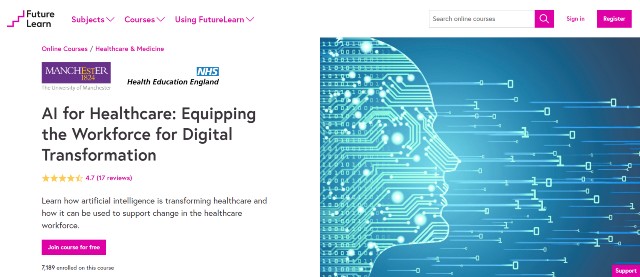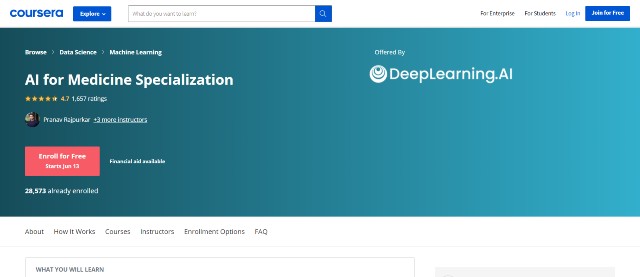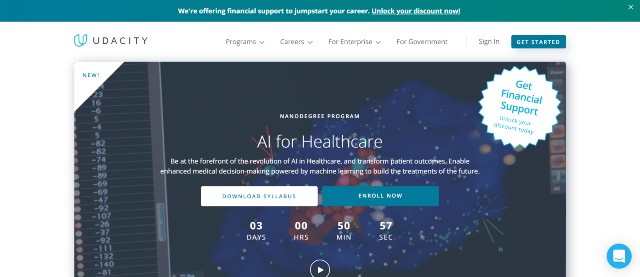Artificial intelligence (AI) is continually evolving. The technology now has diverse uses in health care, ranging from medical diagnosis, treatment recommendations, clinical decision support, drug creation, and many others.
Inevitably, medical professionals will undergo rapid change as more hospitals, businesses, and corporations in the healthcare industry implement AI in their operations.
It is thus crucial for healthcare professionals to learn the gist of AI technologies to better prepare for such change and keep up to date with the latest trends in the industry.
Advancing your AI knowledge also yields excellent career opportunities. As AI becomes a significant force within healthcare, many new jobs are created for professionals who specialize in implementing and integrating AI into healthcare workflows.
As healthcare providers are always busy, it would be best to take online AI in Health Care Courses, so you can learn anywhere, anytime, without the need to worry about missing the classes.
Below are the four best AI in Healthcare courses for professionals in 2021 worth paying attention to:
Affiliate Disclosure: This post from Victory Tale contains affiliate links. If you purchase courses through them, we will receive a commission from course providers.
Nonetheless, we always value integrity and prioritize our audience’s interests. Therefore, you can rest assured that we always evaluate the course truthfully.
Things You Should Know About AI in Health Care Courses
Each AI in healthcare course requires a different background knowledge. Some courses have no prerequisites so that everyone can start the course immediately.
On the other hand, others have prerequisites, including Python and machine learning. Still, you don’t need to be as adept in these topics as computer science professionals to take the courses.
Still, it is highly important to choose the course that suits your background.
All courses in this post will not drill deep into AI technology as those taken by future data scientists, AI engineers, or other data-science-related careers. Instead, you will learn the basics that will help you apply AI to your healthcare career.
1. AI in Healthcare Specialization
This Coursera specialization from Stanford University provides an excellent overview of how AI can help healthcare providers solve problems and improve patient outcomes.

Course Content
The specialization consists of 5 minor courses as follows:
1. Introduction to Healthcare – This first course will explain how the healthcare system of developed countries works and discuss the interactions among participants in the system.
You will gain a complete understanding of the healthcare system’s challenges, including those related to accessibility, cost, and quality.
2. Introduction to Clinical Data – The second course will introduce you to frameworks used for ethical medical data mining. You will explore patients’ collected data and build analysis-ready datasets.
3. Fundamental of Machine Learning for Healthcare – The third course provides an overview of machine learning concepts and how you can apply them to healthcare systems.
4. Evaluation of AI Applications in Healthcare – You will learn how to evaluate AI healthcare solutions in detail, so you can measure their efficiency in performing different tasks in real life.
5. Capstone Project – This final project will provide a hands-on experience in using artificial intelligence in healthcare. You will create a machine learning (ML) model that can recommend patient care based on data collected from various patient visits.
You will utilize all the knowledge you learned from all former courses to complete this capstone project.
The workload is quite light. You should spend only 2 hours per week for 9 months to complete the entire specialization, which is perfect for any busy healthcare provider.
Auditing this specialization is 100% free. However, the full course, which includes graded assignments, feedback, and a certificate, costs $79 per month.
Pros and Cons
Pros
- Learn from industry experts from a globally recognized medical school
- Excellent introductory course with no programming skills required
- Light workload per week, ideal for busy students
- Informative and clear lectures
- Well-structured curriculum
- Wonderful peer-reviewing for the capstone project
Cons
- Minor technical issues regarding quizzes and projects
- Not the best for students who already know the basics
2. AI for Healthcare: Equipping the Workforce for Digital Transformation
This FutureLearn course from the University of Manchester and the NHS is excellent for beginners who want to understand the role of AI in shaping the healthcare workforce in the 21st century.
Unlike the first course, you will not drill deep into the theories or the technical aspects. Instead, you will focus on how hospitals implement AI in various areas such as radiology, pathology, and nursing and how these implementations will affect your career.
The course has no prerequisites, so everyone could start learning right away.

Course Content
The course comprises five parts as follows:
- Motivating AI in Healthcare – The first section will provide an overview of the current uses of AI in the healthcare industry and its impact on different areas of medical expertise.
- What is Artificial Intelligence – The second part will introduce you to artificial intelligence and machine learning. You will understand how both are different from each other, the algorithm, and their benefits to your role.
- Data in Healthcare – The third part will focus on healthcare data, including its relevant challenges and applications (i.e., medical data analysis) to help address healthcare issues.
- Making it work – This fourth section will discuss ethics and consent when collecting health data and how your projects could benefit from working with interdisciplinary teams.
- Supporting and Skilling the Workforce – The last section will discuss the potential of AI in transforming medical practice. You will look at leading examples, particularly cancer diagnosis. Subsequently, you will know the answer to whether AI is your colleague or replacement.
This course is much shorter than the first. You should spend 2 weeks on average for 5 weeks to complete the course.
You can audit the course (no tests and certificate) without any charge for 7 weeks. After that, if you want to keep learning, you will need to pay $79 to access the full course (with tests and certificate.)
As the course content is not very deep, it would be best to stick to the audit option, saving $79 in the process.
Pros and Cons
Pros
- Best Introductory AI in healthcare course for those who don’t want to drill deep into technical aspects
- Learn from leading industry experts in health informatics, medical imaging, and AI
- Excellent course materials, including numerous real-world case studies and examples
- Engaging and informative
- Light workload
Cons
- The free audit lasts only for 7 weeks.
- The full course is quite expensive.
3. AI for Medicine
AI for Medicine is a Coursera specialization from deeplearning.ai. You will understand how to apply deep learning and neural networks to provide reliable solutions in medicine.
Unlike the above courses, this specialization has prerequisites. Before enrolling, you should be able to program in Python and understand college-level probability and statistics. Knowledge in deep learning is also a plus.

Course Content
The specialization comprises three minor courses as follows.
1. AI for Medical Diagnosis – This course will explain how to use AI for more accurate medical diagnosis. You will then create a CNN (convolutional neural network) to perform image classification to diagnose lung and brain disorders.
2. AI for Medical Prognosis – The second course will discuss the use cases of artificial intelligence in medical prognosis. You will also build a tree-based machine learning model to predict the mortality rate of patients with heart disease.
3. AI for Medical Treatment – This final course will explain how to utilize AI to provide better treatment recommendations. You will apply model interpretation techniques, use natural language processing (NLP) to extract health information from radiology reports/lab tests, and build an AI-based treatment effect predictor.
The suggested pace for this specialization is 7 hours per week, which is considerably higher than the first two courses. However, with this pace, you can finish the course in only three months.
Auditing the entire specialization is also free. However, I highly recommend you enroll in the full course, which costs $49 per month, as you will get feedback on how you build your models, so you can ensure that you are on the right track.
Pros and Cons
Pros
- Practical courses for students who want to understand the benefits of AI in healthcare
- Cover a wide range of concepts and techniques
- Numerous real-life use cases and scenarios
- Well-structured curriculum
- Manageable workload
Cons
- Reviewers point out that some parts of the specialization are too basic.
- Some assignments can be particularly challenging for students.
4. AI for Healthcare
This Udacity Nanodegree program will provide a deep dive into all aspects of using artificial intelligence in healthcare. You will build real-world machine learning models that can improve patient outcomes.
Similar to the third course, you will need background knowledge before enrolling. This includes intermediate Python, NumPy, machine learning, and deep learning. You should also have experience using different machine learning frameworks, such as Tensorflow or PyTorch.

Course Content
This program comprises four sections as follows:
1. Applying AI to 2D Medical Imaging Data – The first section will equip you with fundamental skills to work with 2D medical imaging data.
You will then learn to use AI to gather insights by applying proper tools to perform exploratory data analysis on the data and finally build a specific AI which suits a particular clinical scenario.
2. Applying AI to 3D Medical Imaging Data – You will learn how to work with 3D medical imaging data in this section. You will understand how clinicians use such data in real life and apply machine learning algorithms to solve healthcare providers’ problems in the clinical workflow.
3. Applying AI to EHR Data – You will learn about EHR data, including data privacy, security standards, common challenges, and data analytics. Subsequently, you will use Tensorflow to build interpretable models to unveil uncertainty and bias based on EHR data.
4. Applying AI to Wearable Device Data – The final section will focus on building algorithms that process data from wearable devices to gain insights regarding the wearer’s health. Building blocks of relevant technology, including ECG, IMU, and PPG, will also be covered.
Projects: Unlike other AI in healthcare courses, every section of this Udacity course provides a real-world project for you to work on. Upon course completion, you will complete as many as 4 projects.
These include building models to detect pneumonia from chest X-ray data, selecting the right patients for diabetes drug testing as a data scientist, building an algorithm that can estimate the pulse rate, etc.
Student Support & Workload
Like other Udacity programs, you will gain access to excellent support from the team, including the following:
- Technical Mentor Support – you can ask any questions related to the program. Your mentor will answer them in less than 50 minutes on average.
- Project reviewers – industry experts will review your projects and provide personalized feedback, tips, and tricks to improve your model. There is no limit to project reviews. You can send unlimited requests and experts will review your work for you.
- Career Services – Like web development bootcamps, Udacity has a team that provides career services, including resume, Github portfolio, and LinkedIn profile reviews. These would be helpful if you are seeking a new career.
The weekly workload for this program is 15 hours per week for 4 months, which is quite intense for full-time healthcare providers.
Still, this will not cause any problems, as the entire program is self-paced, so you can spend as much time as you want on the course. The only drawback is that you will need to pay extra tuition if you finish the program later than the estimated time.
Pricing
The tuition is $399 per month. However, if you pay for all 4 months at once, you will receive a 15% discount. Thus, you will pay only $339 on average per month.
In my opinion, you should go with the monthly option, unless you are confident that you have time to complete the course in 4 months.
This is because the monthly option allows you to pause your studies and pay nothing for the following month, providing more flexibility, which is excellent for those with busy, unpredictable schedules.
Many prospective students may wonder whether this program is worth the high price. I would say it is 100% worth it.
Though some of the course content overlaps with the 3rd course (Deeplearning.ai’s), this program drills much deeper in both concepts and applications. As a result, you will have more opportunities to work on real-world, in-depth projects.
You will also receive much better instructor support, which is essential in learning such complex topics.
Exclusive Tips: Udacity frequently offers discounts and financial support on its website. Based on my experience, you can save as much as 75% on the monthly tuition.

Pros and Cons
Pros
- Comprehensive learning experience (Videos, quizzes, assignments, projects)
- Numerous real-world projects for students to obtain hands-on technical experience in the field
- Excellent 24/7 support from mentors
- Unlimited, swift project reviews
- Discounts are frequently available on the website.
- Career services are a plus.
Cons
- Costlier than other alternatives
- Intense weekly workload
Other Artificial Intelligence in Healthcare Courses
Machine Learning for Healthcare – This edX course from MIT covers both theories and projects for students who want to perceive how to best utilize the power of AI in healthcare.
However, enrollment for this course on the platform has been closed. Therefore, you will need to wait until MIT announces a future opening date.
As the AI industry is still nascent and open to many applications, I believe there will be more AI in healthcare courses in the future. If I find new courses, I will add them to the list for my audience to have more excellent ones to choose from.